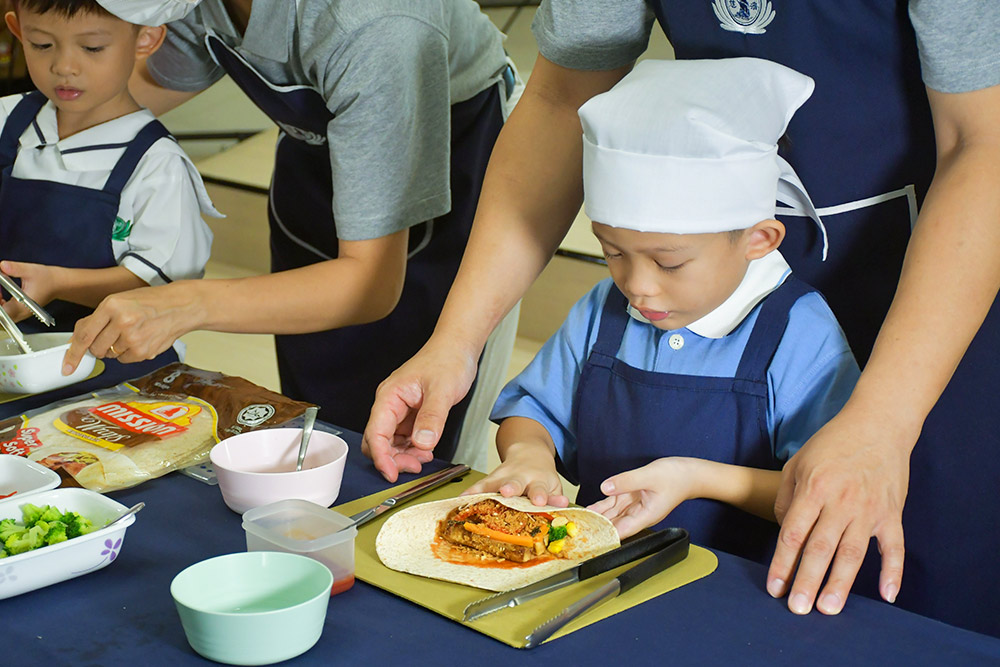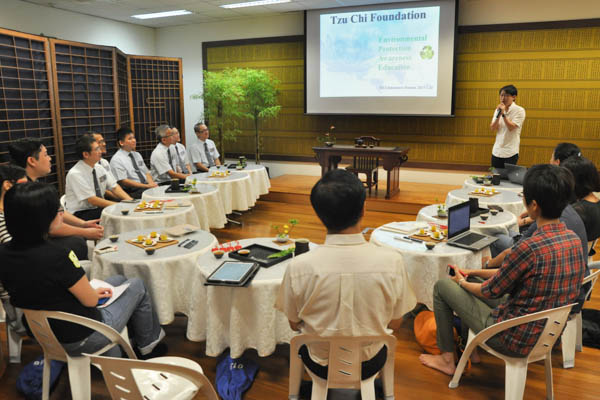 Having served as a volunteer with Tzu Chi for more than a decade, Hoo Soo Moi no longer seeks an “easy and relaxed” retirement life. Instead, she feels more peaceful and at ease with her busy and fulfilled lifestyle. (Photo by Fong Kwai Kin)
Having served as a volunteer with Tzu Chi for more than a decade, Hoo Soo Moi no longer seeks an “easy and relaxed” retirement life. Instead, she feels more peaceful and at ease with her busy and fulfilled lifestyle. (Photo by Fong Kwai Kin)
“After retirement, I found myself an office job. I had a lot of free time on weekends, so I would chat and have coffee with a group of friends at the market or go travelling and attend social gatherings. However, I felt very bored with such a lifestyle,” shared 76-year-old veteran Tzu Chi volunteer Hoo Soo Moi.
After the South Asia Tsunami took away nearly 300 thousand lives at the end of 2004, Tzu Chi Singapore helped raise funds for disaster relief in the aftermath.
Hoo recalled how she got connected with Tzu Chi at that time: “I happened to walk past Tzu Chi’s (former) Free Clinic in Chinatown one day and saw some volunteers raising funds for the tsunami disaster relief. It was drizzling, so I stood at a spot opposite the clinic. Coincidentally, I bumped into a colleague and tagged along with her to make a donation to Tzu Chi. Then, I became a regular donor.”
When she was at her aunt’s place in Malaysia previously, she happened to read some Tzu Chi newsletters and learned how the Dharma masters (Tzu Chi’s founder Dharma Master Cheng and her monastic disciples) in Taiwan work to sustain their own livelihood and how they selflessly serve those in need in society. Gradually, she discovered more about Tzu Chi and was deeply moved by the words and actions of Master Cheng Yen.
However, due to her busy work life as a hawker, Hoo did not have much opportunity to join Tzu Chi’s activities then. Even after getting an office job where she only had to work during the day, she was still hesitant to join the VWO. The sight of the volunteers neatly clad in their uniforms working as a team at the Free Clinic filled her with awe.
In the first six months of becoming a Tzu Chi donating member, Hoo insisted on personally making her monthly donations at the Free Clinic. There was a shortage of manpower at the newly set up clinic at that time, and most of the patients were Cantonese-speaking elderly women. One day, when Hoo was making her donation at the counter, Tzu Chi volunteer Lim Teck Seng asked her whether she speaks Cantonese. She responded swiftly with a “Yes”, and since then, she joined the ranks of Tzu Chi volunteers and started volunteering at the clinic whenever she was free during the weekends.
Over a decade of unwavering service
After shutting down her hawker business more than ten years ago, Hoo mainly lives on her savings and irregular allowances from her children. Unexpectedly, the HDB flat in Block 136 at Redhill, where Hoo lives alone by herself, became the “birthplace” of a Tzu Chi recycling point in the South Zone.
The reason we do recycling in Tzu Chi is not just to earn money from selling the recyclables, but also to learn to cut down on waste and make it a good habit.”
“Environmental protection is also one of Master Cheng Yen’s teachings. She wants us to conserve the environment to protect Mother Earth. The reason we do recycling in Tzu Chi is not just to earn money from selling the recyclables, but also to learn to cut down on waste and make it a good habit,” said Hoo, as she explained why she was determined to continue doing recycling work.
In 2006, Hoo visited Tzu Chi’s Jing Si Abode in Hualien, Taiwan, with members of the Tzu Chi International Medical Association (TIMA) in Singapore. There, she listened to Master Cheng Yen’s talk on environmental protection and visited Tzu Chi’s recycling station in Neihu, Taipei.
"The elderly volunteers at the recycling station were already very advanced in age and their backs were hunched; yet they still volunteered there. I was greatly inspired by them,” shared Hoo as she recalled her memory of that visit.
After returning to Singapore from Taiwan, Hoo began collecting old newspapers and other recyclables and sent them to the Free Clinic in Chinatown every month. As the amount of recyclables she collected continued to increase, sending them to the free clinic became an increasingly difficult task.
Thus, Tzu Chi Singapore’s senior volunteer and current deputy CEO, Khoo Kean Yee, and a few other volunteers, proposed to set up a recycling point at the void deck of Hoo’s block to make it easier to facilitate the collection of recyclables and to have them directly collected by a recycling merchant. This further spurred Tzu Chi to hold its Recycling Day activities on every second Sunday of the month.

A volunteer helping Hoo Soo Moi to move the recyclables from her home to the Tzu Chi recycling point at the void deck of her block. (Photo by Pok Siew Chin)
However, more often than not, things do not go as smoothly as they ideally should. Hoo said at that time, the elevator in her block did not reach the fourth floor where she lives, and only stopped on the odd numbered levels. So the volunteers had to take the lift to the fifth floor with the heavy items for the recycling point and then move them down to the fourth floor.
“It was really hard on the male volunteers. They had to move the heavy display boards up and down the stairs every month. It pained me to see that," said Hoo.
To make it easier for the elderly residents to contribute to her recycling endeavour, Hoo insisted on going from door to door to collect the recyclables. However, as age catches up with her, she is no longer as physically fit as before. Her persistence and determination to do recycling tug at the heartstrings of many who witness her tireless efforts.
She said that the reason why she is so insistent and determined is that most of the people living in the vicinity are elderly people, so she did not want to trouble them to carry the heavy recyclables down to the void deck by themselves. She felt that it would be quite embarrassing not to personally collect the recyclables from them as they have specially kept the items for Tzu Chi.
As there is a lot of cleaning and tidying up work to do at the end of each Recycling Day activity, coupled with the shortage of manpower, it is hard on Hoo, who is already quite advanced in age, to finish all the tasks.
If everyone leaves and goes home after the recycling activity, who is going to do all the cleanup work?”
She said as-a-matter-of-factly, "If everyone leaves and goes home after the recycling activity, who is going to do all the cleanup work? I was troubled by this thought at the beginning, but after some time, I realised that if I don’t stay and do it, the other volunteers will slacken as well, so I have to be persistent. After all, the work is a form of spiritual cultivation, too.”

Hoo Soo Moi sorting out some recyclables at the Tzu Chi recycling point below her HDB block. (Photo by Fong Kwai Kin)
Hoo has devoted to recycling work for more than a decade, and her efforts and hard work deeply touched Tzu Chi volunteer Ting Yu Sing.
"At such an advanced age, she is still working so hard to do (recycling). I admire her spirit very much. She still insists on doing recycling even when her legs hurt or when she falls sick. On rainy days, she would make a raincoat out of plastic bags, put it on, and keep working. Master Cheng Yen said, ‘Be happy to give, and be happy to accept whatever comes our way'. I can really see this spirit in her," said Ting.
Adopting a new lifestyle with determination
Besides volunteering at the Tzu Chi recycling point, Hoo also gets up at five o'clock every morning to listen to the early morning Dharma talk by Master Cheng Yen. She has followed this routine for the past five years.
"It was very difficult for me to get up so early at the beginning, because it was too early, and I did not have enough sleep. But now, I’m used to it. I go to bed at 9 o'clock in the evening, so that I can get up at 5 o'clock the next morning," shared Hoo.
Strength comes from willpower.”
In addition to that, Hoo spends two days a week serving at the Tzu Chi Free Clinic in Redhill. Her life has become more meaningful and fulfilling after participating and volunteering in various Tzu Chi events and activities. Despite her age, she believes that “strength comes from willpower”.
“It is up to us to manage our time, and it is also our own choice if we choose to be slack,” she said.
 In October 2018, Hoo joined other Tzu Chi volunteers to raise funds in the streets. (Photo by Fong Kwai Kin)
In October 2018, Hoo joined other Tzu Chi volunteers to raise funds in the streets. (Photo by Fong Kwai Kin)
“Actually, I am very thankful to my kids for ‘donating’ me to Tzu Chi, because my youngest grandchild is still in primary school, and I occasionally need to help look after him,” said Hoo, feeling grateful to her family for their support.
We must love and protect the earth, because only when our planet is clean will we have a healthy life.”
After joining recycling activities for over a decade, she has learned to spend her money even more wisely. She would think twice before buying anything and think of ways to reuse items instead of discarding them. She is also able to save more on water and electricity. All these habits stem from her unwavering belief in these words of Master Cheng Yen: “We must love and protect the earth, because only when our planet is clean will we have a healthy life.”
After listening to Master Cheng Yen’s Dharma talks for more than ten years, Hoo is no longer as bad tempered as before and does not easily get agitated or angry over petty matters.
“When we are interacting or working with people, we must not throw tantrums easily. Instead, we should forge positive affinities with others, or we may offend someone and lose a friend,” said Hoo. And this is the greatest change that she has seen in herself.
“Master Cheng Yen said that ‘losing temper is like being insane’. We need to change our own bad habits ourselves, and we should not speak foul and unpleasant words,” she said.
Hoo also realised that the positive change in her has made it easier for her to recruit donating members for Tzu Chi and to invite her neighbours to take part in recycling activities.
Ten plus years of Tzu Chi journey has helped Hoo realise that life is impermanent. “It is hard to tell what will happen in the future. If I fall sick one day, I will not be able to do Tzu Chi’s work, even though I wish to do it.”
The Bodhisattva Path does not lie far away; it is in the now. Hoo seizes every precious moment in the present to contribute as much as she can, and is determined to continue her spiritual practice in Tzu Chi.



